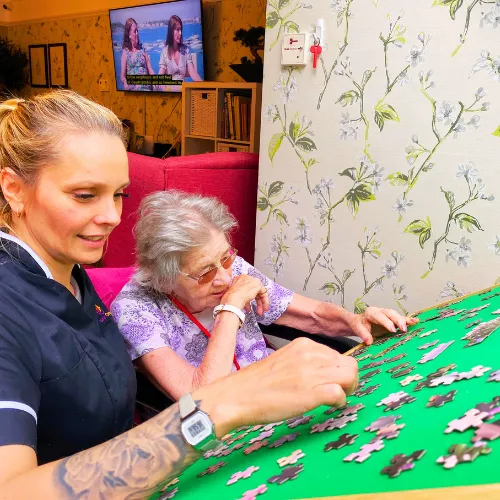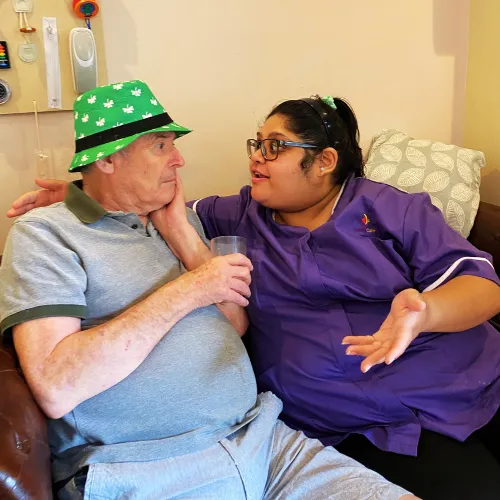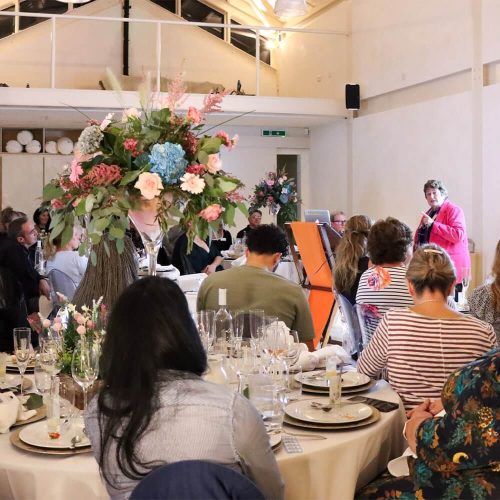Person-centred Dementia Care Approach
All our care homes across Bournemouth and Poole specialise in dementia care and follow a careful and well-researched approach to the care provided.
Dementia is a progressive condition with each individual experiencing different symptoms at each stage. This makes every person’s journey with dementia different.
We want to ensure we can provide the correct care at the right stage without clipping your loved one’s wings.
We achieve this by creating bespoke care plans for each resident, and this is no more important than for those living with dementia. We follow Dr Gemma Jones’ Behavioural Staging Model to ensure we meet your loved ones’ unique needs at the right time.
Book a visit to our care homes to learn more about this approach. Call us on 01202 037373.


What Is The Behavioural Staging Model Approach to Dementia Care?
The Behavioural Staging Model from Dr Gemma Jones provides a reference point for our staff to refer to and track behaviour and symptom changes over time.
By using this model, we can integrate your loved one’s life story with their current needs, helping us piece together behaviour and understand triggers or progression.
In doing this, we provide the ideal care defined by Dr Gemma Jones as “The attitude and supportive actions which make a person feel valued, safe, nurtured and cared for, regardless of their illness, the stage of their illness, irrespective of their gender, race, creed, past achievements, or their shortcomings as a human being.”
While using the Behavioural Stages Model, we can give your loved one the care they deserve by anticipating their changing needs and identifying the stage of the disease they are in.
If you want to learn more about how we implement this model in our care, don’t hesitate to give us a call at 01202 037373.
Who is Dr. Gemma Jones?
Dr Gemma Jones is an internationally known dementia care specialist, renowned for her work and education around providing care to the individual rather than the condition.
With a background in cell biology, gerontology and nursing, she has produced this unique and respectful way of caring for loved ones with dementia that allows them to feel validated at every stage, as well as enabling them to stay independent for as long as possible.
Having published several publications on caregiving in dementia, she now teaches caregivers her approach so that they can map out the care needed to their patient’s story.

Putting Dementia Symptoms Into The Four Stages
The Behavioural Stages Model gives staff a shorthand to describe your loved ones’ needs within the wider context of the condition, looking to understand how they are adapting to the changes in their function. It keeps the focus on your loved one as an individual rather than a condition.
The model breaks the progression of dementia into four stages:
Malorientation, mild confusion
- Short-term memory loss that they try to hide
- Reduced attention span
- Awareness of “mishaps” such as misplacing items or forgetting things.
- Trying to hide their forgetfulness
- Struggles to find words and losing thread of thought
- Might get angry, defensive, tense and anxious
Time confusion, moderate confusion
- Visibly disorientated
- Loss of sense of chronological time
- Not always aware of season or year – might refer to deceased person
- Becoming disinhibited
- Loses a sense of social etiquette and starts to say exactly what they are thinking
- Language becomes more obviously affected – might invent new words to replace ones they forget
- Losing thread of thought more often
- Limited attention span
- Constant misplacing of items
- Less aware of the “mishaps” they make, such as memory deficits
- Retreating to happier memories so appear happier and more relaxed
- People in this stage can sometimes not identify the family members as the family members, but they will be able to recognise them on the emotional level
Repetitive motion, severe confusion
- Verbal ability is limited – might use short phrases or whistle or sing sometimes
- Repeat phrases often throughout the day
- Minimal effort to start a conversation
- Severe sensory deficits
- Repeated movements such as rocking, tapping, patting or fiddling with clothing
- Often sit or lie for most of the day
- Can recognise family members as familiar but can’t remember their names or the relationship
Withdrawal
- Appear to sleep most of the day
- Almost no body movement due to loose muscles
- Don’t recognise family members
- Seem to withdraw from the outside world
- Respond to loud noises and unusual stimuli such as music, friendly voice, favourite foods or a massage
We use these four stages to map out your loved one’s progression and put the right level of care in place so your loved one can continue enjoying a quality of life.
Book to visit one of our care homes to see how we implement this into a care plan and the day-to-day interactions with our residents. Call us on 01202 037373.
Why Choose LuxuryCare for Dementia Care in Poole and Bournemouth?
Choosing a dementia care home can feel overwhelming and difficult. But the team at each LuxuryCare home is proud to offer specialist dementia care that puts your loved one at the centre.
But, our approach to dementia care is just one reason why people choose us.
Our facilities are all designed with dementia in mind, meaning we have visual cues, signage and bright colours around each home to help your loved one independently navigate the home.
We encourage your loved one to personalise their room to make it a true home from home. Bring pieces of furniture, bedding, photos and more.
Each home has an activities coordinator who creates weekly activities programmes full of fun and engaging games and activities. Each activity is adapted to meet your loved one’s abilities.
Our in-house chefs create personalised food plans for each resident as part of their care plan. This ensures they get the nutrients they need in our home-cooked meals.
All of our homes have beautifully kept gardens for our residents and their guests to enjoy. In summer, the gardens are a favourite area for activities and tea.
We love furry friends visiting our homes, so encourage friends and family to bring in their pets to say hi to our residents. They never fail to put a smile on everyone’s faces.

Want to Know More?
There is a lot to the behavioural stages model and our approach to dementia care, so we understand you might have a few more questions about this approach.
We believe the best way to get some answers is to visit us at one of our care homes where you can see for yourself how we integrate this care approach into our day-to-day life.
Call us on 01202 037373 or complete our online contact form to book your visit or chat with our team about your questions. We are always happy to help.















